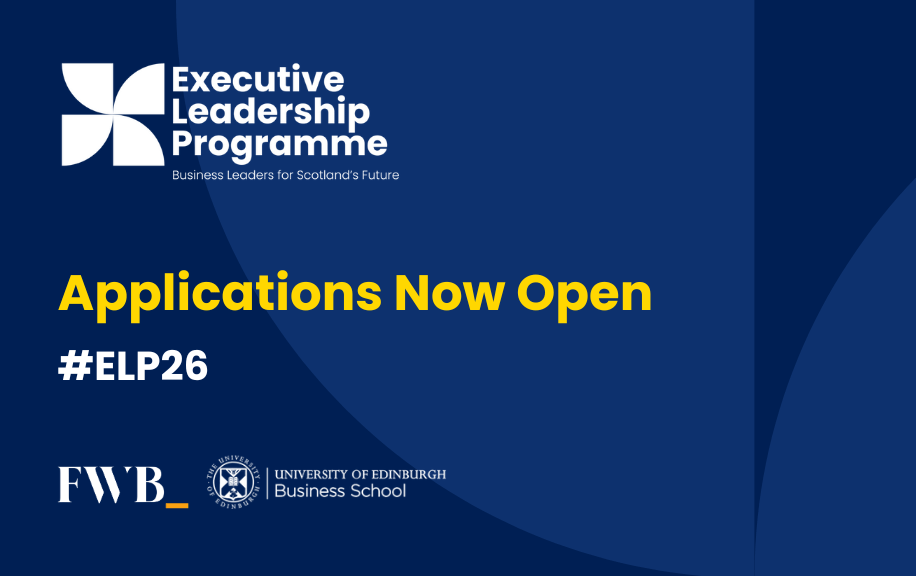Contact the team at FWB to discuss your individual or company requirements, or to discover more about our specialist services.
A Question of Growth: Business, Government and the Future of Scotland’s Economy
12 June 2025
- Leadership Development
- FWB Events
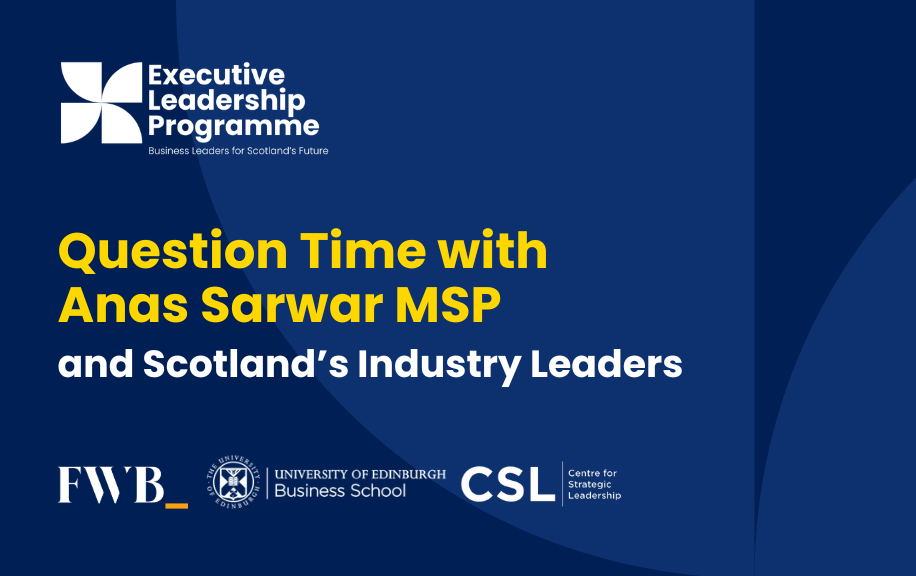
A Vision for Economic Renewal
In partnership with the University of Edinburgh Business School and its Centre for Strategic Leadership, we recently hosted a special ‘Question Time’-style debate to explore the opportunities and challenges facing Scotland’s economy. The evening brought together some of the nation’s most respected voices from business, academia and politics to tackle the question: what will it take to unlock Scotland’s full potential?
Introduced by Professor Gavin Jack and Professor Sir Peter Mathieson, the event welcomed alumni of the FWB & University of Edinburgh Executive Leadership Programmes alongside a diverse mix of founders, investors, non-executives and advisors. What united them was a deep interest in building a more prosperous, confident and competitive Scotland.
Scotland is blessed with extraordinary advantages—world-class universities, an enviable natural environment, strong sectoral specialisms, and a rich heritage of invention. Yet despite this, it continues to face stubborn and systemic challenges: sluggish productivity, labour shortages, unaffordable housing, skills mismatches, weak infrastructure, and an often risk-averse culture.
The evenings debate and conversation centred on three critical questions:
- What are the biggest opportunities ahead for Scotland’s key sectors – and are we doing enough to seize them?
- What structural and policy barriers are holding businesses back – and what must change?
- What role must leaders, government, and enterprise play together to unlock growth, drive innovation, and deliver sustainable prosperity?
To explore these questions, we were joined by a remarkable panel of senior leaders representing Scotland’s core sectors:
- Paul Cooley, Director of Offshore at SSE Renewables and Chair of RenewableUK
- Vikki Macleod, Chair Libereat, Safehinge Primera, MSL and Non-Executive Director for AND Digital and MDDUS
- Bob Brannan, former Chair of Walkers Shortbread and MD of Whyte & Mackay and William Grant & Sons
- Andrew Richards, Founder of Glenesk Homes and housing and construction veteran
- Anas Sarwar MSP, Leader of the Scottish Labour Party
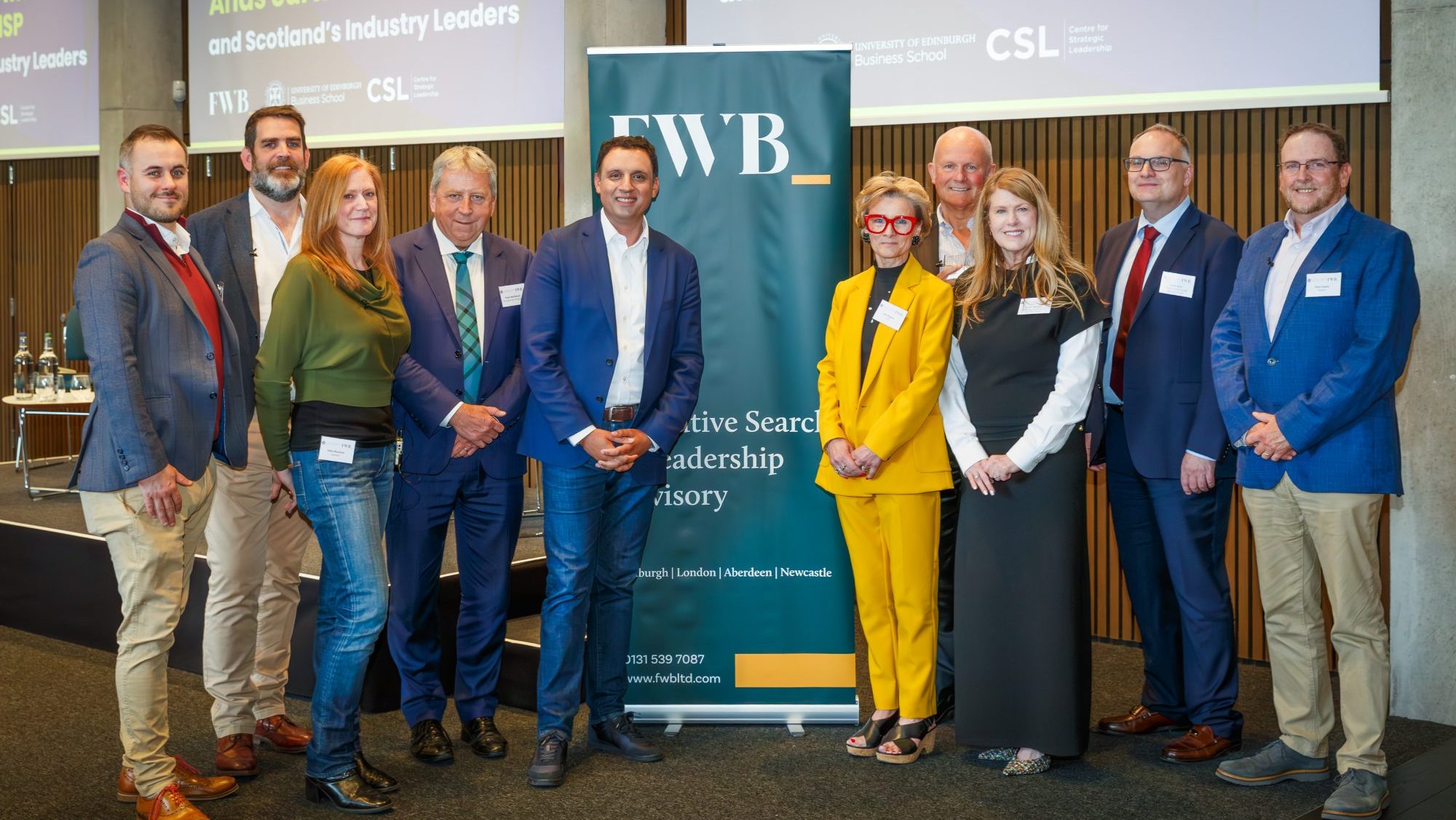
From Insight to Action: Sector Snapshots
Housing and Development: Gridlocked by Design
Andrew Richards was unequivocal: “We need 10,000 new homes annually in Scotland—but we’re falling woefully short.” He highlighted how planning inefficiencies and infrastructure constraints are stifling development:
“Even a modest 15-unit site needs over £100k invested at risk just to reach a planning decision—and it could take 18 months.”
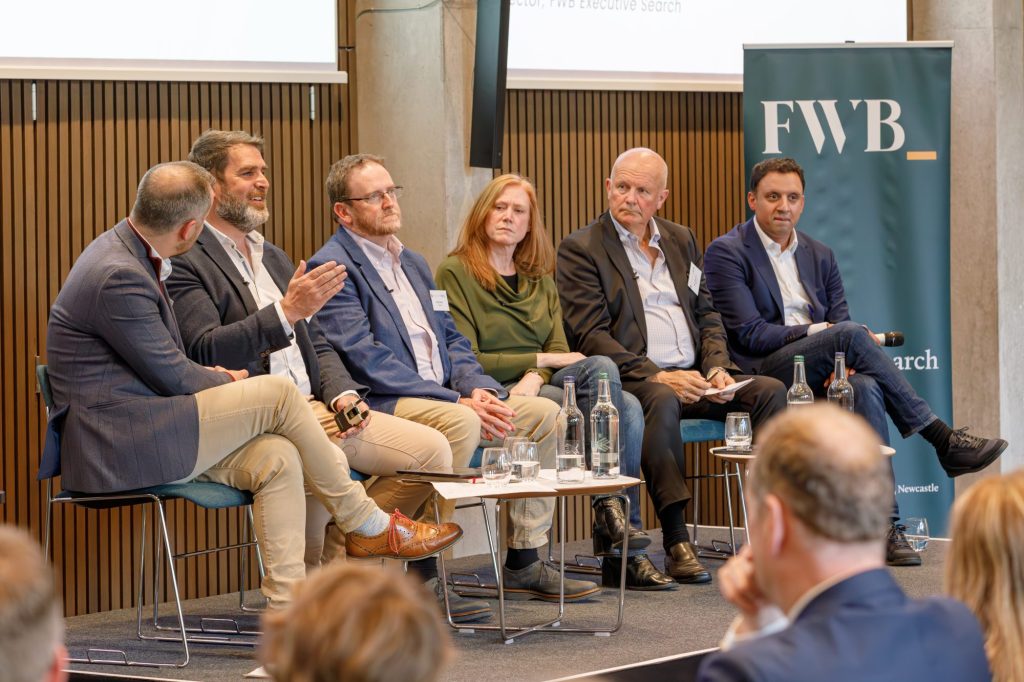
He cited Scotland’s restrictive National Planning Framework (NPF4), limited land supply/access, and escalating build costs as major deterrents for developers. Coupled with rent controls and investor-hostile tax regimes, Scotland’s housing investment proposition lags well behind England’s.
Yet Richards remained optimistic: “We know the economic value of housebuilding—jobs, supply chains, community wellbeing. What we need is political will and joined-up planning reform.”
.
As a result, the need is clear – stronger partnership between industry and government is needed to reform planning and to reconsider rent cap policies to ramp up housebuilding across all tenures. Significantly more money needs to be invested in homes for social rent if we are to address the appalling homelessness statistics.
Clean Energy: A Windfall at Risk
Paul Cooley called Scotland’s renewables potential “a once-in-a-lifetime opportunity”—with a triple advantage of wind, talent, and policy ambition. But major hurdles remain:
“High transmission costs and glacial consenting timelines are choking momentum. We’re playing with one hand tied behind our back.”
Clean Energy currently employs 275,000 people in the UK, which is expected to triple over the next 10 years. However, to create more jobs, we need to grow our structural capabilities. Investment is required in schools, colleges, and higher education to direct both men and women into STEM subjects.
He urged greater investment in STEM education and faster consenting frameworks, adding: “The sector is ready to invest £30 billion in network infrastructure. But we need education and policy to keep up. Skills and speed of decision will be the fuel that powers this green engine.”
Digital & Tech: Big Ideas, Small Confidence
Vikki Macleod struck a cultural chord. “Scotland doesn’t lack innovation. It lacks confidence. We’re brilliant at invention—but not so much at scaling it.”
She called for a nationwide digital push that reached every person, every business, and every competitive advantage:
“Digitise everybody, digitise everywhere, digitise every advantage.”
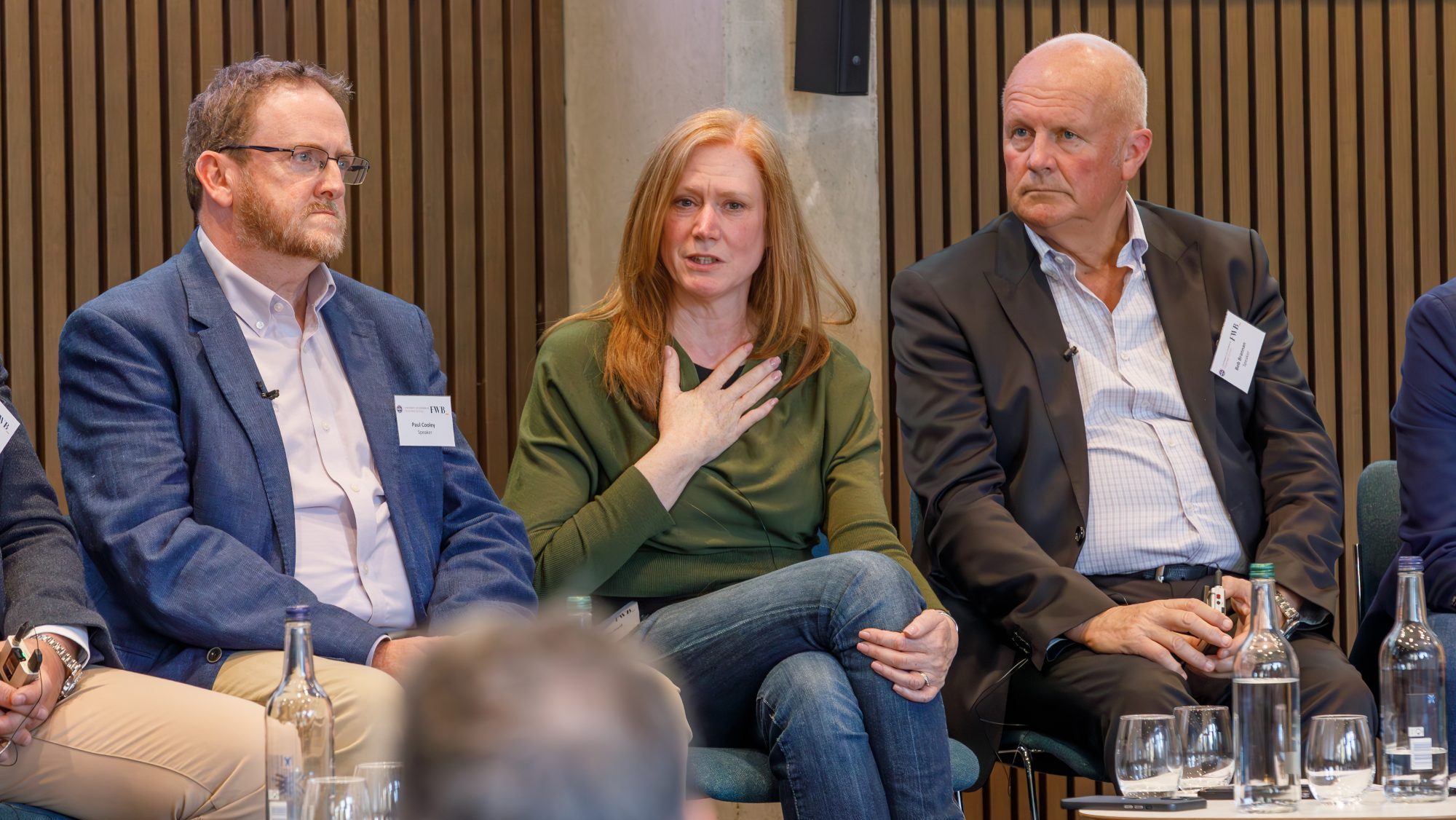
Vikki emphasised the need to close the gap between ambition and capability, and highlighted three key areas that government can help to kickstart a digital revolution:
- Talent: Upskilling and providing access to digital tools for all.
- Infrastructure: Businesses must embrace digital transformation, embedding digital transformation across operations and markets.
- Capital: Access to funding is key to scaling innovation.
She emphasised the role of government in setting the stage with supportive policies but also urged businesses to help themselves. Peer-to-peer networks and strong partnerships are key. Vikki has long advocated for finding the right digital partner to accelerate transformation without reinventing the wheel. Great partnerships can help businesses upskill, driving long-term success. She highlighted tools like AND Digital’s AI Adoption Accelerator as examples of how capability can be built quickly with the right partnerships.
Food, Drink & Provenance: Selling Ourselves Short
“The single biggest opportunity for Scottish businesses in the Food & Drink sector is to exploit the positive perception that exists, worldwide, of the provenance of Scottish produce. The reality, however, is that ‘true’ Scottish provenance in the sector is undermined by the lack of availability of ingredients grown and farmed in Scotland due to the decline in Scottish farming over recent decades, which is being put under further threat by the recent proposed changes to Inheritance Tax.”
Bob Brannan spoke candidly about Scotland’s most iconic exports, highlighting clear issues challenging the Scottish provenance we rely on if raw materials and but what ingredients can’t be grown our sourced here or the talent to make these products can’t be recruited or developed. He warned that Scotland’s declining agricultural base, combined with burdensome taxes and diverging policies, risked undermining both brand and business:
“England and Wales are fast becoming tax havens by comparison. We’re losing out on talent, capital, and credibility.”
He called for tax reform, local agricultural support, and a more globally-minded brand strategy to restore Scotland’s competitiveness.
A New Kind of Partnership
Anas Sarwar MSP then joined a lively discussion alongside our panellists and audience members which called for:
- A new collaboration between government and business
- Use of all the economic levers devolved to Scotland
- A strategic approach to skills, infrastructure and innovation
The discussion identified eight levers of reform that must be modernised and used to support growth in the modern economy:
- Income Tax: Tax policy must support growth, not be used as a substitute for growth.
- Planning: Planning needs to be reformed to speed up decisions. A national planning agency is needed to increase capacity unlock development.
- Business Rates and Licensing: Reform is essential to reflect changing retail and town centre dynamics.
- Transport: Poor infrastructure hampers connectivity and productivity.
- Skills System: The skills system needs modernised to equip individuals for the jobs of the future and deliver the skills employers need. This should start with prioritising apprenticeships and directing revenue from the levy towards skills.
- Regional Development: Scotland needs place-based, regional strategies to reflect local economic realities.
- Investment: Scotland needs a more streamlined approach to attracting investors to Scotland and creating opportunities for investment.
- Enterprise Agencies: Bureaucracy should be stripped back in favour of investment in capability and delivery.
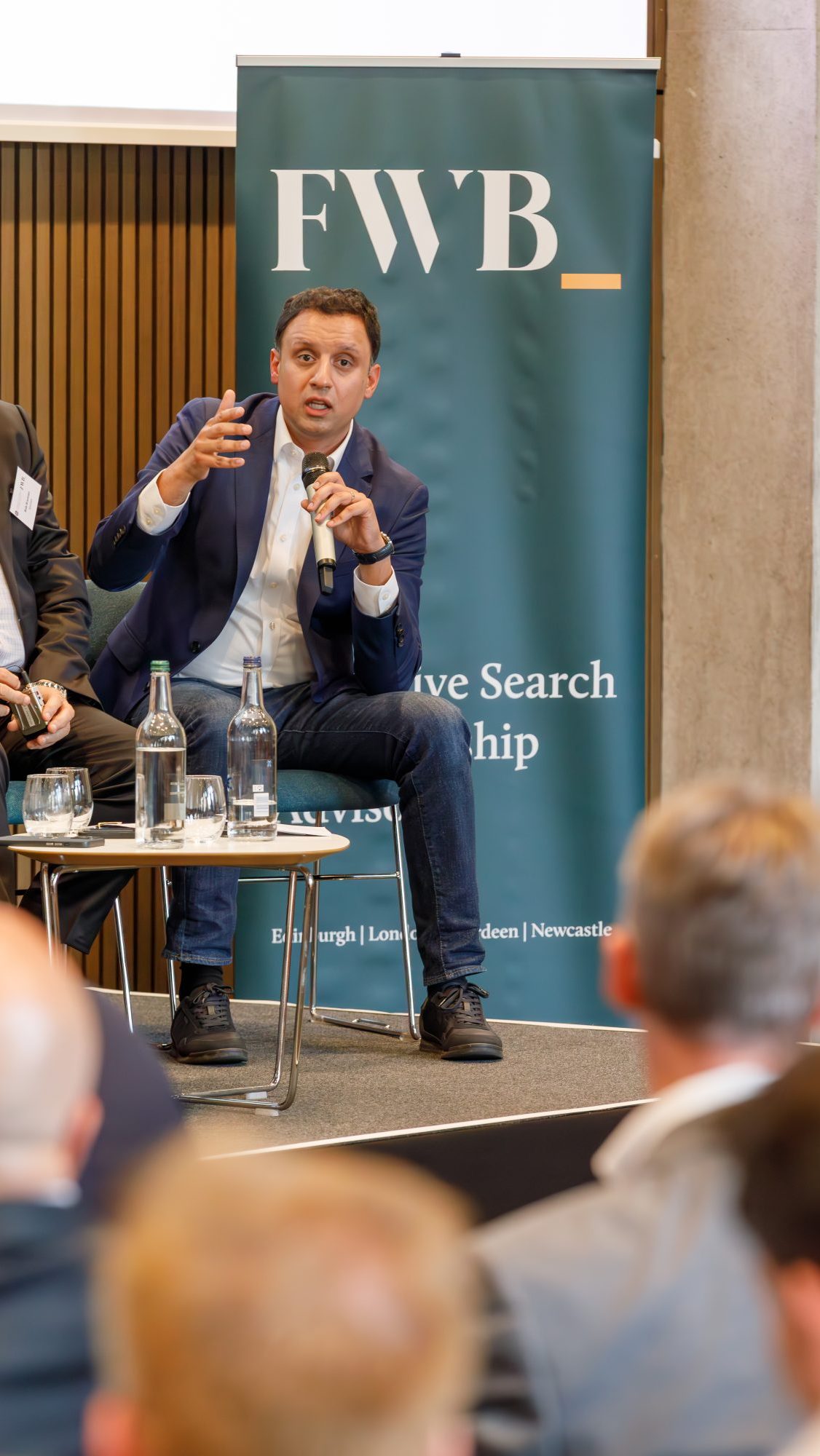
And it was believed that through these levers the country could achieve:
- A genuine partnership model between government, business and higher education
- Strategic pipeline planning to align ambition with delivery
- Smarter, outcome-driven use of government resources
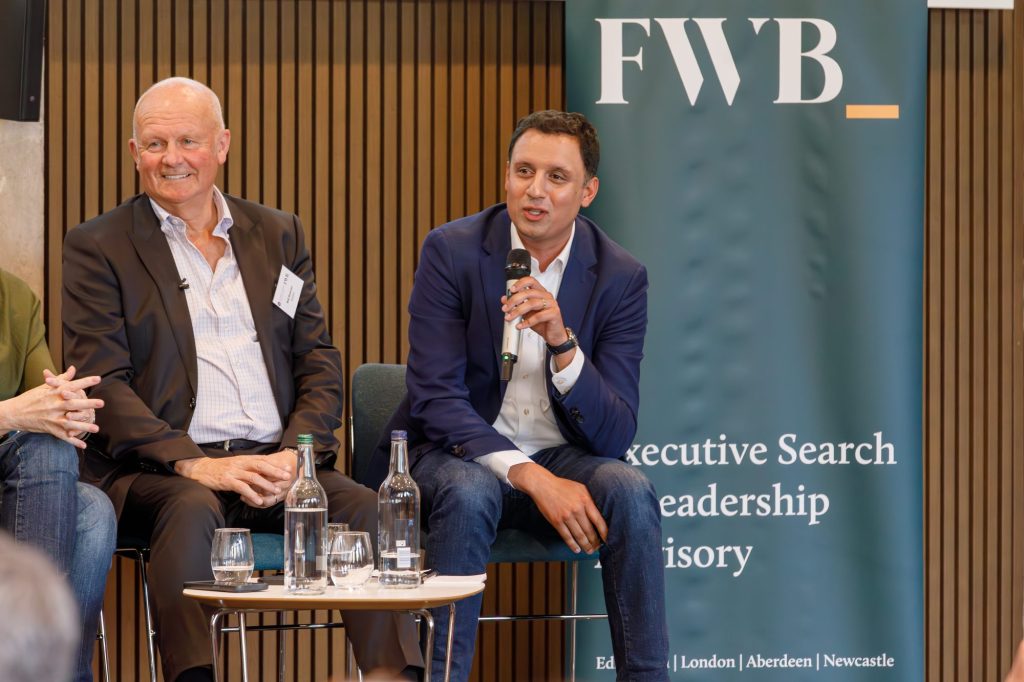
Conclusion: Confidence, Cohesion and Collective Action
This event underscored a simple but powerful truth: Scotland does not lack ambition, ideas or talent—but it often lacks the systems, confidence and coordination to deliver at scale.
Government must move beyond short-term political cycles and take bold steps to modernise planning, taxation, education and infrastructure. Business must shed risk aversion and invest in partnerships, people and innovation. Academia must modernise, partner with businesses more on supply and demand and continue to bridge theory with practice—offering applied insight, research and leadership development.
Only together—business, government and academia—can Scotland chart a new course: one defined not by missed potential, but by shared progress. The opportunity is not abstract—it is immediate, tangible and personal. If we rise to meet it, Scotland can lead in clean energy, digital innovation, Scottish provenance, responsible growth and global influence. But to do so, we must embrace urgency, build capability, and reclaim the confidence to lead.
“We are rich in people and ideas—but held back by under-confidence and disjointed systems. It’s time to align vision with delivery.”
— Anas Sarwar MSP
Executive Leadership Programme
FWB and the University of Edinburgh Business School’s Executive Leadership Programme (ELP) will return for its fifth year in September 2025. The programme was established following the successful launch of both the Executive Women in Leadership and Non-Executive Development Programmes. Collectively, these initiatives have supported over 700 delegates in furthering their careers.
The ELP is designed to enable the next generation of leaders across a broad range of private, public and non-profit sectors, spanning multiple ownership models and organisational contexts.
As part of the ELP, programme alumni are invited to stay connected through the ELP Alumni Network, which hosts events such as this debate—providing an ongoing platform for learning, collaboration and leadership dialogue.
For more information on our ELP, click here: https://www.fwbltd.com/education/executive-leadership-programme/





